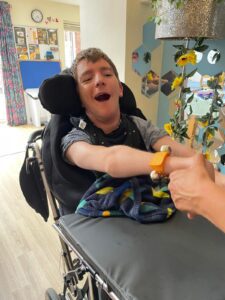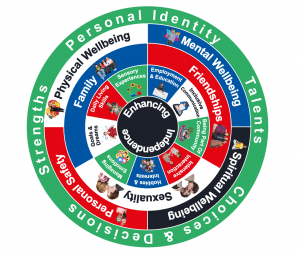BILD* describes intensive interaction as ‘a practical approach to interacting with people with learning disabilities who do not find it easy communicating or being social’. We use intensive interaction to help people we support and their support workers to relate to each other and develop communications confidence and rapport.
An effective method of helping to build bonds between people we support and those who support them, intensive interaction is not simply a technique, it’s a philosophy. Attention is centred around the person, aiming to establish genuine connections through communication and respect.
While the examples in this post are about people with profound and multiple learning disabilities, intensive interaction is a practice that we advocate across all homes to support communication, engagement and rapport. It forms part of our teams’ Wheel of Engagement training to create quality interactions that are meaningful and mindful. Resources include videos from specialist not-for-profit Us in a Bus.
Building rapport and trust
Ewelina is Home Manager at a residential home for people with profound and multiple learning difficulties in Brighton. She says: “We spend time with each person, perhaps mimicking facial expressions and having a conversation through that. We maintain eye contact if the person is comfortable to do so. With some people we might pass a toy back and forth, which also helps with physical wellbeing. All of these build rapport and trust and let people we support know that it’s ok to express yourself and communicate in any way you can.”
Respect and observation
Respect and observation are key elements in intensive interaction. By closely observing body language, support team members are able to see whether the person they are interacting with is comfortable with the communication. “We learn through people’s reactions what works for them and what does not. By doing so, we can adjust the type and level of interaction. We accommodate individual preferences since we recognise that everyone communicates in different ways,” explains Ewelina.
“Every day we work to generate ‘butterfly moments’ – those delicate, yet transformative instances where a person we support feels truly seen, heard, and valued.”
Ewelina and her team try to incorporate the philosophy into every aspect of their everyday interactions to reinforce connections and bonds through the day. For example, if they pass by someone they will be sure to give them a beaming smile, possibly say their name – and can be rewarded with a smile, perhaps a movement that shows their communication has been received and welcomed.
Sense of belonging
The development of a strong sense of belonging is one of the most significant effects of intensive interaction. People feel truly connected and respected, beyond the routine of care. Due to the deliberate nature of these exchanges, people can participate actively in a community that values their individuality and sees them as more than just people that need support.
“A strong sense of belonging is essential for mental and emotional health as well as for having a positive attitude on life in general,” says Ewelina. “My team members have built great bonds with people we support and you can feel it when you watch them. I think that is the biggest benefit of intensive interactions.”
Hanging Out programme
Along with three other residential homes in Brighton, Ewelina’s team members have embraced the Hanging Out Programme. Based on intensive interaction, this involves them in spending 5-10 minutes a day as a ‘buddy’, absorbed in meaningful engagement with each person. Through the programme, they are also recording and evaluating their interactions to share with each other and further improve the lives of people they support.
With genuine connections formed and flourishing, the outcomes are evident both for people supported and team members. People supported are more relaxed and happier which in turn makes the support team happy. Family members have also noticed and remarked upon this.
Positive outcomes
James previously spent much of his time snoozing, was very shy and made no sounds at all. Through intensive interaction and hanging out, he has become much more alert and is communicating with sounds. His mother has commented on how awake and alert he is.
Thomas attends college every weekday, which is good for his independence yet means that he spends less time with his support team. Intensive interaction has enabled stronger connections to grow. Thomas’ mother, Valerie, said: “I have seen [team members] giving Thomas the options of two toys and clothes to allow him to eye point his choice, and I have seen them frequently chat to Thomas to engage his attention.”
She continues: “They congratulate Thomas when he presses his musical instrument toy by himself, which he positively reacts to with laughter and smiles. There is a positive, happy atmosphere. Thomas is content, healthy and clearly loves living there.”
*British Institute for Learning Disabilities
Find out more about the Wheel of Engagement




